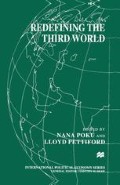Abstract
The aim of this chapter is to illustrate and examine the ways in which the modern capitalist world order (CWO) is developing in its current phase of political, economic and social restructuring. The implications of these quantitative and qualitative transformations in the CWO are profound, and are of particular significance for any redefinition of the Third World in international relations (IR). My argument will be that while the categories of core and periphery are central to any political geography of the current CWO, the ways in which they have been developed in both Dependency Theory and World-Systems Theory are not sufficiently sensitive to the fluid and uneven nature of global development, broadly construed.
Access this chapter
Tax calculation will be finalised at checkout
Purchases are for personal use only
Preview
Unable to display preview. Download preview PDF.
Notes and References
D. Harvey, Social Justice and the City (London: Edward Arnold, 1973), pp. 290–2.
J. S. Nye and W. A. Owens, ‘America’s Information Edge’, Foreign Affairs, vol. 75, no. 2, March-April (1996), pp. 20–36.
D. Sudjic, The 100 Mile City (London: Andre Deutsch, 1992), p. 239.
See N. Megalli, ‘Hunger Vs the Environment’, in C. Kegley and E. Wittkopf (eds), The Global Agenda (New York: McGraw Hill, 1995).
R. Dahl, A Preface to Economic Democracy (Los Angeles: University of California Press, 1985), pp. 4–5.
W. Hutton, ‘Myth That Set the World to Rights’, Guardian, 12 June (1995).
M. Ferguson, ‘The Mythology About Globalisation’, The European Journal of Communication, vol. 7 (1992), pp. 69–93.
D. Drache, ‘From Keynes to K-Mart: Competitiveness in a Corporate Age’, in R. Boyer and D. Drache (eds), States Against Markets (London: Routledge, 1996), pp. 31–61.
S. Burchill, ‘Liberal Internationalism’, in S. Burchill and A. Linklater (eds), Theories of International Relations (London, Macmillan, 1996), pp. 50–63, illustrates the level of intrafirm trade in the global economy.
R. Cox, ‘Production, the State and Change in World Order’, in E-O. Czempial and J. N. Rosenau (eds), Global Changes and Theoretical Challenges (Lexington, Mass.: Lexington Books, 1989), p. 46.
N. Chomsky, ‘The Third World at Home’, in N. Chomsky, Year 501: The Conquest Continues (London: Verso, 1993).
L. Brown and H. Kane, Full House: Reassessing the Earth’s Population Carrying Capacity (London: Earthscan, 1995), p. 46 for information on the widening levels of global income distribution.
S. Castles and M. J. Miller, The Age of Migration (London: Macmillan, 1993).
Various authors, ‘A World in Social Crisis’, Third World Resurgence, Special Issue, December (1994).
M. Bienefeld, ‘Is a Strong National Economy a Utopian Goal at the End of the Twentieth Century?’, in R. Boyer and D. Drache (eds), States against Markets.
S. Gill, American Hegemony and the Trilateral Commission (Cambridge: Cambridge University Press, 1990).
R. Reich, The Work of Nations (New York: Vintage Books, 1992).
P. Gowan, ‘Neo-Liberal Theory and Practice for Eastern Europe’, New Left Review, vol. 213, September-October (1995).
R. Jenkins, Transnational Corporations and Uneven Development (London: Methuen, 1987), p. 177.
M. Shaw, Global Society and International Relations (Cambridge: Polity Press, 1994), pp. 72–9.
See P. Krugman, ‘The Case for Stabilising Exchange Rates’, The Oxford Review of Economic Policy, vol. 15, no. 3, Autumn (1989).
E. M. Wood, Democracy Against Capitalism (Cambridge: Cambridge University Press, 1995).
F. Lyotard makes this point in his The Postmodern Explained (Minneapolis: University of Minnesota Press, 1992), pp. 77–8.
E. Linden, ‘The Exploding Cities of the South’, Foreign Affairs, vol. 75, no. 1, January-February (1996), pp. 567–93.
E. B. Kapstein, Governing the Global Economy (London: Harvard University Press, 1994).
M. D. Alleyne, International Politics and International Communication (London: Macmillan, 1995), p. 21.
S. Sassen, ‘Economic Globalisation’, in J. Brecher et al., Global Visions (Boston, Mass.: South End Press, 1993).
A. Jarvis, ‘Societies, States and Geopolitics’, Review of International Studies, vol. 15, no. 3 (1989), pp. 281–93.
M. Castells, The Informational City (Oxford: Basil Blackwell, 1989), pp. 238–69.
See T. Lang and C. Hines, The New Protectionism (London: Earthscan, 1993).
R. Jenkins, Transnational Corporations, and S. Chan (ed.), FDI in a Changing Global Economy (London: Macmillan, 1995).
D. Sudjic, The 100 Mile City p. 5, notes that culturally global cities have more in common with each other than they do with the rest of their respective countries.
J. Saurin, ‘Globalisation, Poverty and the Promises of Modernity’, Millennium: Journal of International Studies, vol. 25, no. 3, Winter (1996).
P. Virilio, Open Skies (London: Verso, 1997).
R. Dahl, A Preface to Economic Democracy, pp. 54–5;
and N. Chomsky, The Prosperous Few and the Restless Many (Berkeley, Calif.: Odanian Press, 1993), p. 20.
Editor information
Editors and Affiliations
Copyright information
© 1998 Macmillan Press Ltd
About this chapter
Cite this chapter
Wilkin, P. (1998). World Cities, Capital and Communication. In: Poku, N., Pettiford, L. (eds) Redefining the Third World. International Political Economy Series. Palgrave Macmillan, London. https://doi.org/10.1007/978-1-349-26966-2_7
Download citation
DOI: https://doi.org/10.1007/978-1-349-26966-2_7
Publisher Name: Palgrave Macmillan, London
Print ISBN: 978-1-349-26968-6
Online ISBN: 978-1-349-26966-2
eBook Packages: Palgrave Political & Intern. Studies CollectionPolitical Science and International Studies (R0)

